
Bits of Borno: A Conversation with Photographer Fati Abubakar, 10/25, 1 pm
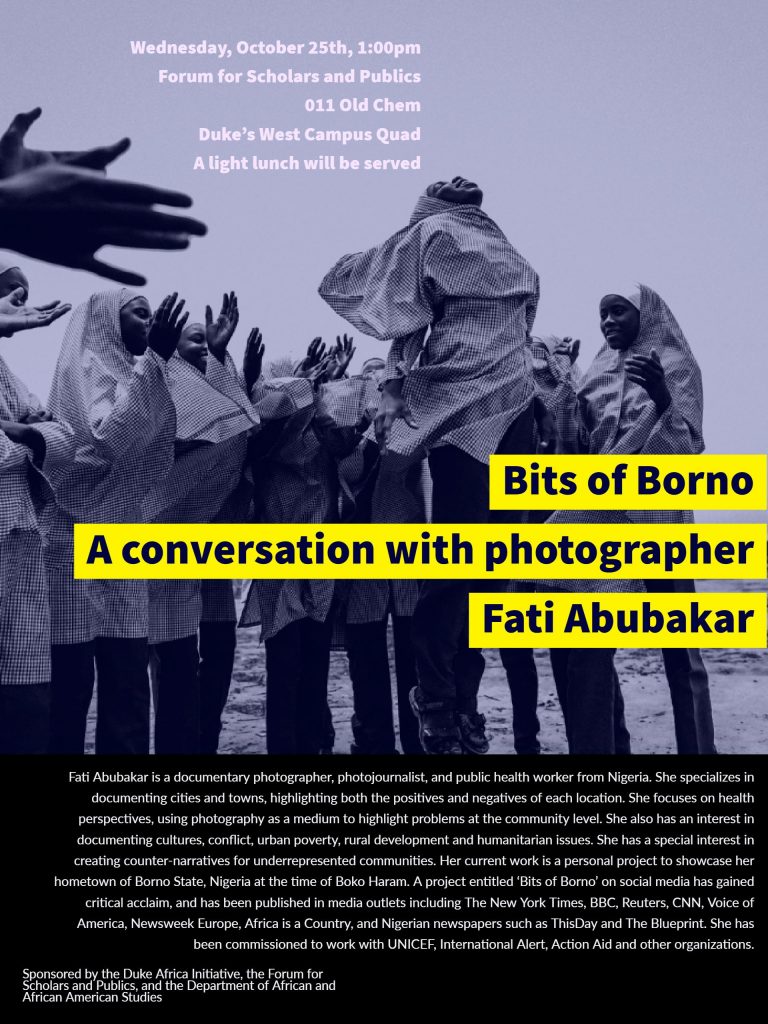
Wednesday, October 25, 2017
1:00 pm – 2:00 pm
Forum for Scholars and Publics
Duke’s West Campus Quad
011 Old Chem
A light lunch will be served.
Photographer Fati Abubakar has embarked on a personal project to showcase her hometown of Borno State, Nigeria, in the time of Boko Haram. “Bits of Borno” on social media has gained critical acclaim and has been covered in media outlets including The New York Times, the BBC, Reuters, CNN, Voice of America, Newsweek Europe, Africa is a Country, and Nigerian newspapers such as ThisDay and The Blueprint. Abubakar will speak about documenting everyday life in Borno and share some of the photographs from this series. Her work can be viewed at instagram.com/bitsofborno.
Sponsored by the Duke Africa Initiative, the Forum for Scholars and Publics, and the Department of African and African American Studies.
A profile of Fati from the New York Times can be found here: https://www.nytimes.com/2016/06/30/world/africa/boko-haram-nigeria-maiduguri-bitsofborno.html
Further information about the event can be found here: https://fsp.trinity.duke.edu/projects/bits-borno
“The Extravagance of Drones,” The Global South After 2010: Epistemologies of Militarization Working Group Mtg, 10/19, 6-8 pm
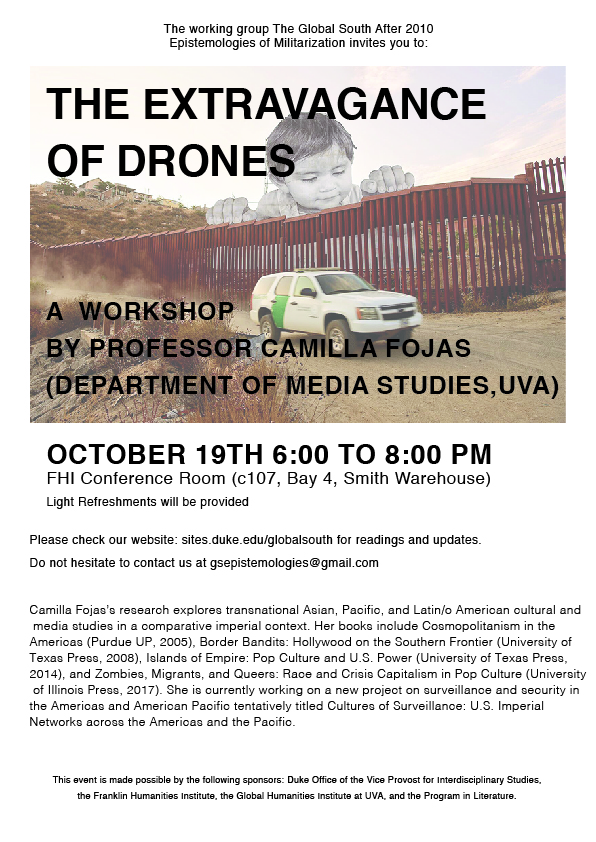
“Chronicling Marcus Garvey and the UNIA: The Process of Research and Writing the African Diaspora,” 10/18, 12 pm

Speakers: Robert A. Hill, Ph.D. and Michaeline A. Crichlow, Ph.D.
This conversation between Professors Robert A. Hill. and Michaeline A. Crichlow, Department of African and African American Studies will discuss Hill’s career as a chronicler and historian of the African Diaspora through the writing of his now 13-volume Marcus Garvey and the Universal Negro Improvement Association Papers project. Hill‘s research has taken him through the expanse of the African Diaspora as he combed through personal, public, and private archives to document the life and pan-African influence of Marcus Garvey, one of the leading intellectual voices of the early 20th century. Hill‘s papers are now housed in the John Hope Franklin Research Center at the David M Rubenstein Rare Book & Manuscript Library. Professor Hill is at Duke University for a one week fellowship to celebrate the archive and share with the Duke community.
This event is presented by the John Hope Franklin Center, and Duke University’s Center for International and Global Studies. A light lunch will be served. Parking is available in nearby Trent Rd and Erwin Rd parking decks. The series provides 1 hour parking vouchers to guests.
(For more information, please visit here.)
In Our Backyard: The Realities of Post-Resettlement Life and Community-Based Approaches to Rebuilding Home, 11/2, 7-8:30 pm (UNC)
(This event is at University of North Carolina at Chapel Hill. For more information, please visit here.)
THURSDAY, NOVEMBER 2, 7-8:30 PM. COURSE #3507
Real-life stories – beyond the facts/figures, de-bugging some of the myths. What are the realities of daily life as a refugee? What are the barriers to refugee support efforts, how do we make them sustainable, what are the benefits and challenges of academic/community partnerships, and what solutions can we provide within the local community, to integrate refugees and respond to the need? Join us as we engage with refugee community leaders, share their stories, celebrate successes, and learn ways the community can get involved.
Madison Hayes, Executive Director, Refugee Community Partnership of Chapel Hill, Carrboro.
Madison’s work centers around building vibrant, sustainable food systems that bolster resilient local economies. She co-founded the Refugee Community Partnership in Carrboro, NC, and designed its community-led food distribution program, The Food Mint, a hallmark of local community-driven food access solutions. She serves on the Board of Directors for three local organizations, and is an advisor and guest instructor at UNC. Prior to The Food Mint, Madison served as Executive Director of the Office of Community Outreach, Dissemination and Education at the UNC Center for AIDS Research. She was the co-leader of a nationwide coalition that plants and grows Community Advisory Boards at health research institutions. In 2014, she presented to the National Institutes of Health (NIH) and other national leaders on coalition building between academic institutions and communities. Madison holds a degree in Mass Communications from the University of North Carolina-Asheville, and a certification from Duke University in Non-Profit Leadership.
Nicole Accordino is project co-director at Transplanting Traditions Community that helps refugees develop entrepreneurial skills through sustainable farming. The project is located on an eight-acre plot of land in Chapel Hill, where refugees, most of whom are Burmese, harvest produce to sell. One hundred percent of the generated profit goes directly back to the farmers. The organization also provides English, communication, public speaking and leadership skills classes as well as childcare in the summer.
Screening: Salam Neighbor, 10/26, 7-9 pm (UNC)
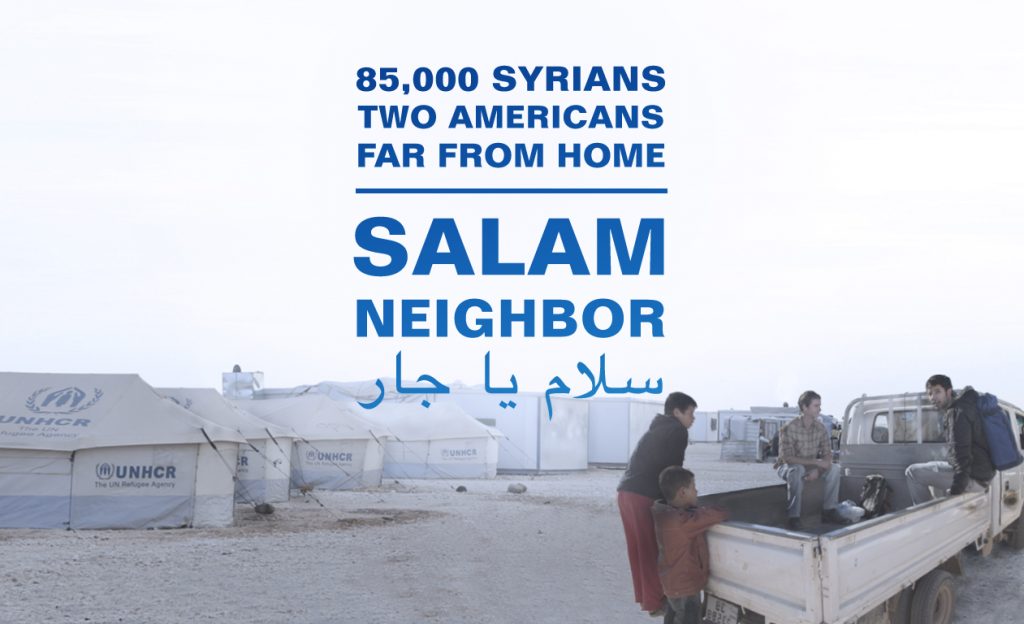
(This event is at University of North Carolina at Chapel Hill. For more information, please visit here.)
THURSDAY, OCTOBER 26, 7-9 PM. COURSE #3506
Join us for a film screening of Salam Neighbor, a 2016 award-winning feature documentary that shares stories of the heartbreak and hope of refugee life, as told through the experiences of two American filmmakers. Zach Ingrasci and Chris Temple were the first allowed by the United Nations to set up a tent and live among 85,000 Syrians in Jordan’s refugee camp. The session will include a discussion led by Dilshad Jaff, MD, MPH, UNC Gillings School of Global Public Health. Dr. Jaff (himself a refugee now living here) will share his experience from the field working in refugee and Internally Displaced Peoples’ (IDPs) camps, and will provide updates, current challenges and issues related to the refugee crisis.
Dilshad Jaff, MD, MPH, is a research advisor for conflict prevention and disaster preparedness at the UNC Gillings School of Global Public Health’s Global Health Solutions. He also is a Rotary Peace fellow and holds a Master of Public Health degree from the Gillings School. Dr. Jaff has more than 15 years’ experience in complex humanitarian crises in conflict zones in the Middle East, largely working with the International Committee of the Red Cross. He has experience in designing, implementing, supervising and monitoring health projects and programs during and after complex humanitarian emergencies. In addition to his formal studies in medicine and public health, he has studied medical microbiology with considerable training in conflict resolution.
Refugees: Pathways, Experiences, and Resettlement, 10/19, 7-8:30 pm (UNC)
(This event is at University of North Carolina at Chapel Hill. For more information, please visit here.)
THURSDAY, OCTOBER 19, 7-8:30 PM. COURSE #3505
Co-presenters Scott Phillips and Josh Hinson
Scott’s presentation: Refugees welcomed to the United States come from all over the world, represent a variety of religions, and are invariably hard-working individuals. This session will explore and examine the realities facing refugees resettling in the US, in particular North Carolina; as well as provide updates on current political contexts, such as the travel ban. The session will provide an overview of the refugee issue at the local level with an exploration of the resettlement process, examining both theory as well as practical aspects, through a discussion of local resettlement efforts. The session will also highlight means and methods for community engagement.
Josh’s presentation: Research shows that refugees experience disproportionately high rates of chronic health and mental health issues, including anxiety, depression, substance abuse, and other stress-related disorders. Refugees also face a multitude of barriers to accessing healthcare services, including lack of culturally appropriate treatment and limited access to interpretation services. This session will focus on the refugee experience in North Carolina, and explore the ethical obligations of healthcare professionals to participate in their care. The session will also provide information and resources on best practices for working with refugees in North Carolina.
P. Scott Phillips is a native North Carolinian who joined the US Committee for Refugees and Immigrants North Carolina Field Office as director in November 2015. Before taking on this role, Dr. Phillips has worked in the fields of community development, civil rights, and advocacy for about 15 years. His experiences include serving as a Peace Corps volunteer in Ukraine, carrying out research on marginalized groups in Jordan, Israel and the UK, and promoting greater civic engagement at Duke University. He brings a wide-ranging set of skills and experiences to the office of Director. Dr. Phillips received his Ph.D. in Ethnic Relations from the University of Warwick (Coventry UK), a Certificate in Nonprofit Management from Duke University, a Master’s in Political Science and a B.A. in Anthropology, both from Appalachian State University.
Quentin Joshua (Josh) Hinson is a clinical assistant professor in the School of Social Work at the University of North Carolina at Chapel Hill. His professional interests include immigration, immigrant health, mental health and substance abuse, community organizing and sustainable development. He received a master’s in Social Work at UNC, with a concentration in Adult Mental Health Direct Practice. Josh also serves as a clinical therapist for El Futuro, Inc., and provides mental health and substance abuse assessments and counseling for Spanish-speaking adults and adolescents. He is the recent recipient of the 2017 UNC School of Social Work’s Excellence in Public Service and Engagement Award.
Book Club Series: How Does It Feel to Be a Problem? Being Young and Arab in America, 10/26 and 11/9, 1:30-3:30 pm (UNC)
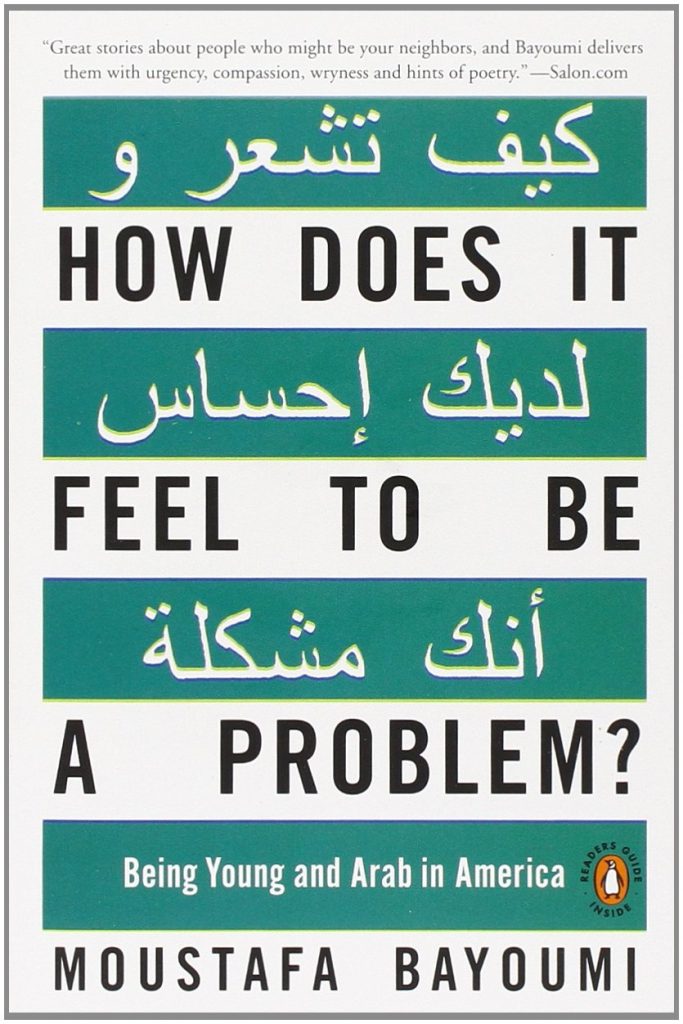
(This event is at University of North Carolina at Chapel Hill. For more information, please visit here.)
Oct & 26, Nov. 9. 1:30-3:30 pm. Fee: $20
INSTRUCTOR: Rita Balaban
COURSE #3509
Note: This series is in conjunction with REFUGEE, a free multimedia art exhibit on display at the Friday Center from September 25-November 3, 2017. Learn more about the exhibit and to plan your visit.
What is it like to be an Arab-American in post 9-11 America? Often talked about, but rarely heard, in his book, How Does it Feel to be a Problem?,Moustafa Bayoumi brings us the stories of seven young Arab-Americans as they navigate the perils of everyday life – college, careers, and finding purpose – under a persistent cloud of suspicion. Join us as we discuss their stories and the treatment of Arab-Americans since 2001. Bayoumi’s book was chosen as the 2017 Carolina Summer Reading book for incoming first-year and transfer students and promises to lead to thought-provoking discussion as it increases our awareness of our fellow neighbor’s struggle to just “be.” Participants will receive copies of the publication at the first session, with the remaining sessions focused on discussions of the book, led by Dr. Rita Balaban, Chair of Carolina’s Summer Reading Project.
Rita Balaban, PhD, is a senior lecturer in the Department of Economics at the University of North Carolina at Chapel Hill. Prior to joining UNC, she taught at the College of Charleston and Samford University. She received her PhD in Economics from the University of Pittsburgh. Dr. Balaban has directed over 20 undergraduate research projects in various areas of economics that include the music and radio industries, international trade, and the economics of sports. She also enjoys doing volunteer work with students in the community. Dr. Balaban served as chair of Carolina’s 2017 Summer Reading Project.
The Black Mediterranean//Dead Cities: Migrancy Working Group, 10/16, 6-8pm
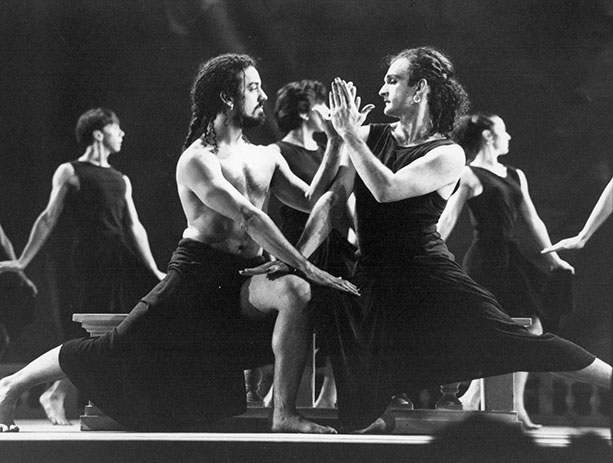
The ongoing surge of refugees crossing from Africa and Syria to Greece and Italy has led scholars and other observers to coin the term “The Black Mediterranean.” It’s an evocative phrase, asking us to rethink the fertile “cradle of civilization” as a necropolitical zone whose brutality matches that of the Atlantic middle passage. Yet the term is meant as more than an analogy. Saucier and Woods argue that “Antiblack violence in the Mediterranean basin has its roots in the earliest racial slave trade in which Italian merchants funded Portuguese raiders across the Mediterranean Sea and down the Atlantic coast of Africa,” and thus “What we are facing today is a new declination of an old and repressed issue that haunts… the European project and modernity itself.”
Screening: Fire at Sea, 10/26, 6-9pm
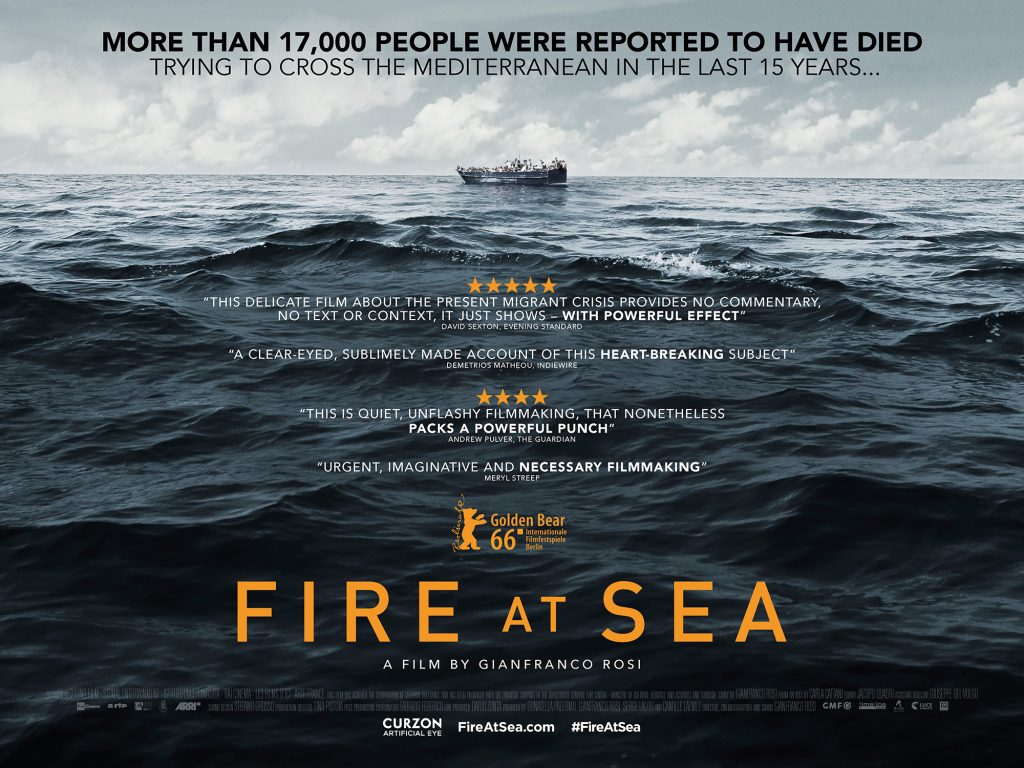
All film screenings of the Representing Migration Humanities Lab will take place in The Edge Workshop Room (Bostock 127). Pizza will be provided, and the film will be followed by a Q&A session.
